Court Marriage in Pakistan | A Guide For Court Marriage
Eligibility Criteria for Court Marriage in Pakistan
To engage in a court marriage in Pakistan, couples must meet specific eligibility criteria, ensuring their union is legally recognized. One primary requirement is the age restriction. According to Pakistani law, the legal age for marriage is 18 years for both males and females. However, in some jurisdictions, the age requirement for males can be 21 years. Couples must provide proof of age through National Identity Cards (NICs) or valid birth certificates.
Another critical eligibility criterion pertains to the marital status of the individuals involved. Both parties must be single, widowed, or legally divorced. Those previously married must present documentary evidence of their current status, such as death certificates for widows or divorce decrees for those divorced. This ensures no legal impediment exists for marrying again.
Consents and approvals are essential for the legitimacy of the court marriage. While Pakistani law allows adults to decide for themselves, parental consent may enhance the process by reducing potential familial and societal conflicts. In cases involving individuals under specific conditions, especially where parties are aged 16-18, parental consent is mandatory for proceeding with the marriage.
The eligibility criteria also encompass interfaith couples and foreign nationals looking to solemnize their marriage under Pakistani law. Interfaith couples face no legal restrictions under the country’s secular marriage laws, but must bear in mind potential religious and societal implications. Likewise, foreign nationals must comply with Pakistani legal prerequisites and provide valid proof of identity, such as passports, and complete the required paperwork.
Finally, the completion of a legally binding marriage contract, known as the “Nikah Nama,” attested by an authorized Nikah Registrar, is imperative for the union’s recognition. This ensures that all court marriages align with legal standards and are henceforth acknowledged.
In Pakistan, the application process for court marriage requires a clear understanding of the steps and meticulous adherence to all administrative protocols. Couples who intend to solemnize their marriage through court must first seek legal assistance. Engaging a lawyer who specializes in family or matrimonial law can be invaluable. Legal counsel ensures that necessary documentation is accurately prepared and guides the couple through the procedural intricacies
How Court Marriage Works in Pakistan
Court marriage in Pakistan is a legally binding procedure, accessible to all individuals regardless of their religion, caste, or creed. The process is straightforward and involves several critical stages. The ceremony is typically presided over by an authorized judicial officer or a Marriage Registrar, ensuring that all legal formalities are meticulously observed.
The initial step towards solemnizing a court marriage in Pakistan involves preparing the necessary documentation. Both parties are required to provide their National Identity Cards (NIC) for identity verification. Additionally, four passport-sized photographs of each individual are mandatory. Proof of address, along with a copy of the CNIC of two witnesses, who are required to be present during the marriage ceremony, is also essential.
Following the preparation of documents, a marriage application must be submitted to the Marriage Registrar or the relevant court official. Usually, this involves filling out a prescribed form where the details of the bride, groom, and witnesses are recorded. This form serves as the primary document for legalizing the marriage.
The next phase involves the submission of an affidavit by both parties, affirming their willingness to marry each other voluntarily. This affidavit is a crucial part of the process as it ensures that the marriage is conducted without any external pressure or coercion. Once the affidavit is submitted, the court official will verify all documents and schedule a date for the marriage ceremony.
On the designated date, in the presence of the court official and witnesses, the marriage is solemnized. The Marriage Registrar or judicial officer administers the Nikah Nama (Marriage Certificate), which both parties and their witnesses must sign. It is also essential that the bride and groom declare their consent to the union three times in the presence of the official to solidify the marriage contract.
Finally, post-solemnization, the Nikah Nama is registered officially, and a copy is provided to the newly wedded couple. This registered document serves as undeniable proof of their marital status and is essential for any future legal proceedings or formalities. The entire process, although detailed, ensures transparency, legality, and mutual consent in every court marriage in Pakistan.
Legal Recognition and Requirements
In Pakistan, court marriages are legally recognized and binding, offering an alternative to traditional wedding ceremonies. Court marriages allow couples to formalize their union under the law, which is particularly beneficial for those seeking a straightforward, cost-effective process. However, it is essential to understand the legal requirements and prerequisites involved in solemnizing a court marriage in Pakistan.
Firstly, both parties must meet certain age criteria. According to Pakistani law, the minimum age for marriage is 18 years for males and 16 years for females. However, it is crucial to note that the legal age requirements can vary depending on provincial laws. For example, in Sindh, the legal age for marriage is 18 years for both males and females.
Consent is a fundamental requirement for court marriages. Both parties must provide their free will and consent to the marriage without any form of coercion or pressure. This mutual consent is a cornerstone principle for the legal validity of any marriage in Pakistan.
Additionally, there are specific documentation requirements. The parties need to submit their national identity cards (CNICs) or a valid form of identification. If one or both parties were previously married, proof of dissolution of the previous marriage, such as a divorce decree or death certificate of the former spouse, must be provided. This ensures that no pre-existing marriages hinder the court marriage process.
Witnesses play a critical role in the proceedings. Typically, a court marriage in Pakistan requires the presence of at least two male witnesses or one male and two female witnesses to attest to the union. The witnesses should also present identification documents to verify their identity.
Lastly, the couple must visit the local union council or the office of the marriage registrar to complete the registration process. This may involve filling out forms, swearing affidavits, and paying the applicable fees determined by the local governing body.
Understanding these legal requirements ensures a seamless experience in solemnizing your court marriage in Pakistan, making the process both lawful and efficient.
The application process for court marriage in Pakistan is straightforward but requires meticulous attention to detail to ensure the submission of all necessary documents. Individuals seeking to solemnize their court marriage are advised to gather the essential paperwork before initiating the process to avoid any delays or inconveniences.
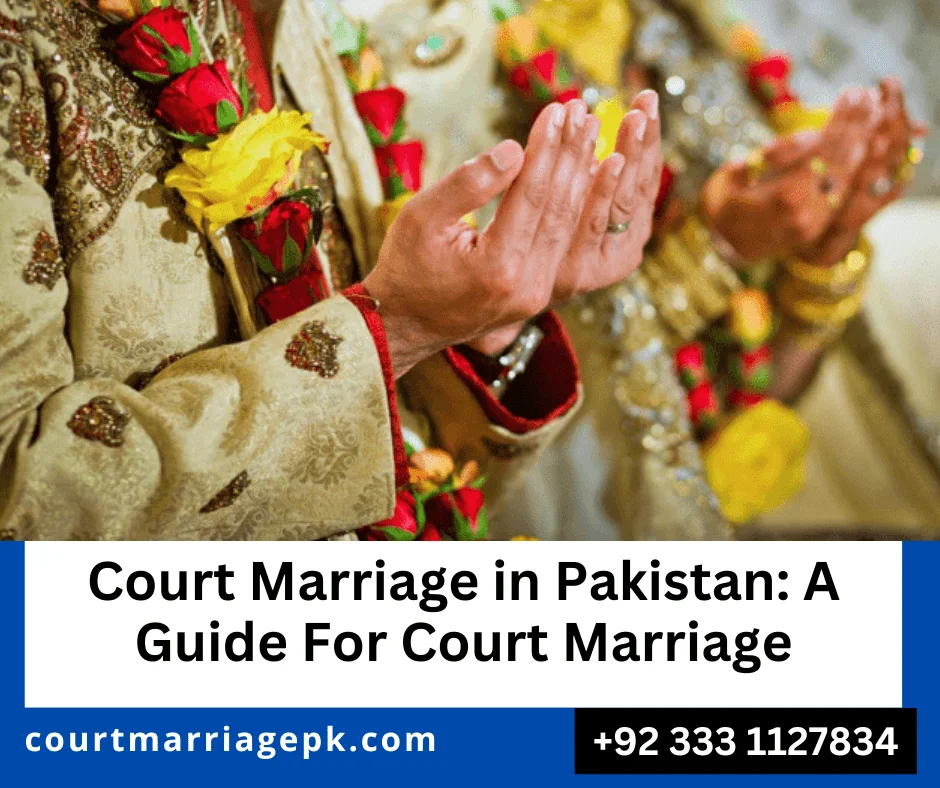
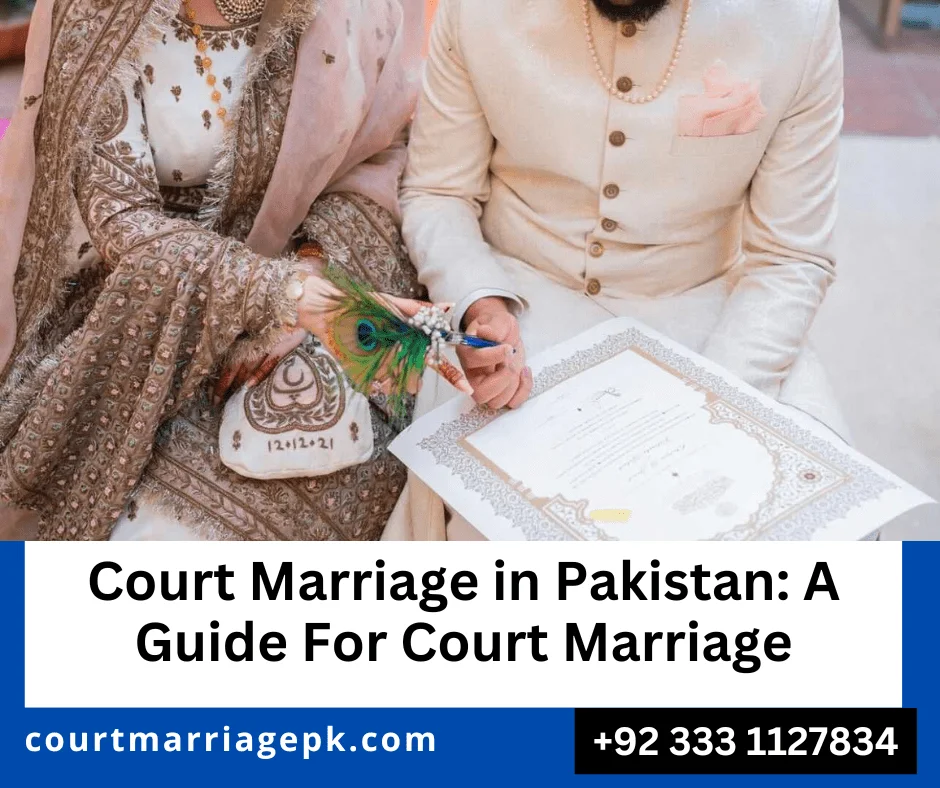
Application Process
Firstly, both parties intending to get married must fill out a marriage application form, available either online or at the local Union Council office. This form requires basic personal details such as names, ages, and addresses. Upon completing the form, both applicants must sign it in the presence of a judicial officer or a marriage registrar. Once the form is verified, it should be submitted to the appropriate authority, often the Marriage Registrar’s Office, along with the requisite fee.
Required Documents
Several documents are obligatory for the court marriage process in Pakistan. These include:
- Computerized National Identity Cards (CNICs): Both parties must present their CNICs for identification verification purposes.
- Passport-sized Photographs: Recent photographs (typically four of each party) are required for record-keeping and official documentation.
- Affidavits of Free Will: Both the bride and groom must submit affidavits affirming that they are entering the marriage of their own free will and without coercion. These affidavits must be signed and attested by a Notary Public or an Oath Commissioner.
- Witnesses: The presence of at least two adult witnesses is essential during the signing of the marriage contract (Nikah Nama). Each witness must have their CNIC for verification.
- Dissolution of Previous Marriages: If applicable, documentation proving the dissolution of any prior marriages, such as a divorce decree or death certificate, must be submitted.
After submitting the application and required documents, the court will schedule a date for a brief hearing. During the hearing, the judge will confirm the legitimacy and mutual consent of the marriage. Once satisfied, the judge will declare the marriage solemnized, and a marriage certificate will be issued, marking the legal recognition of the union.
By following this structured process and ensuring the submission of all required documents, couples can efficiently navigate the legal formalities of a court marriage in Pakistan.
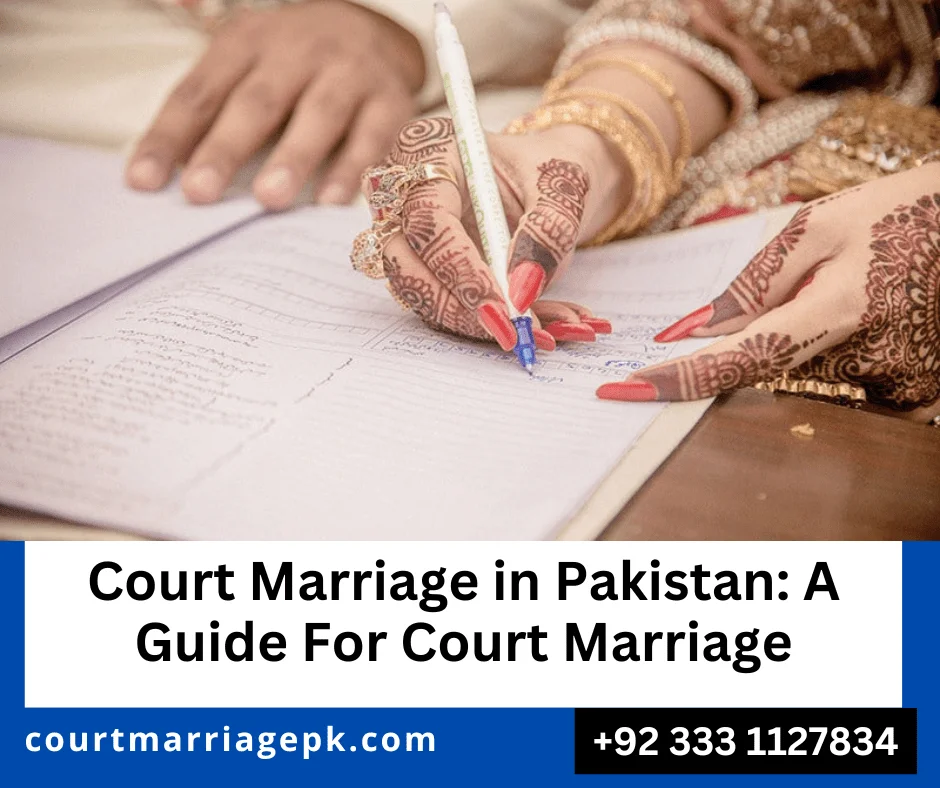
Duration and Cost of Court Marriage
The entire process of court marriage in Pakistan is fairly streamlined, ensuring that couples can formalize their union without excessive delays. Typically, the entire procedure from start to finish takes about one to two weeks. This timeframe includes the gathering of required documents, verification procedures, and the official ceremony. However, it is crucial to note that this duration can vary depending on local administrative efficiency and any unforeseen bureaucratic hurdles. Couples should always plan for potential delays, which can be caused by incomplete documentation or high demand at the concerned offices.
When it comes to costs, court marriages in Pakistan are generally more affordable compared to traditional wedding ceremonies. The primary expenses include administrative fees for documentation, which can range from PKR 5,000 to PKR 10,000. Legal services are another significant cost factor, with lawyers typically charging between PKR 20,000 to PKR 50,000, depending on their experience and the complexity of the case. It is advisable to consult multiple legal professionals to get a clear understanding of the fee structures involved.
Additional costs to consider include the issuance of the marriage certificate or ‘Nikah Nama,’ which may incur a nominal fee. Some courts also require the presence of witnesses to attest to the marriage, which might involve minor expenses if these individuals expect remuneration for their time. Furthermore, although not mandatory, some couples choose to have a modest ceremony to mark the occasion, adding to the overall cost.
In summary, while a court marriage in Pakistan is a cost-effective and time-sensitive option for many couples, it is essential to prepare thoroughly. This preparation includes being aware of the potential duration and having a clear budget in mind to manage the various expenses involved.
Benefits and Differences from Traditional Marriage
Choosing a court marriage in Pakistan offers numerous advantages over traditional marriage ceremonies. One of the most significant benefits is its simplicity. Unlike traditional marriages, which often require extensive preparations, guest lists, and elaborate events that span several days, court marriage is a streamlined process. This simplicity can substantially reduce the stress often associated with planning a wedding.
Another notable advantage is cost-effectiveness. Traditional marriages in Pakistan can be financially burdensome due to the expenses involved in hosting large gatherings, arranging multiple ceremonies, and meeting cultural expectations. In contrast, a court marriage typically involves minimal costs, covering only essential legal fees and documentation requirements. This budget-friendly approach can be particularly appealing to couples who prefer to allocate their resources to other life priorities.
Privacy is another compelling factor. In a country where weddings are considered social events with sizeable attendance, a court marriage provides the couple with the opportunity to solemnize their union without public scrutiny. This aspect of privacy ensures that the occasion remains an intimate affair shared only among close family members and friends if desired.

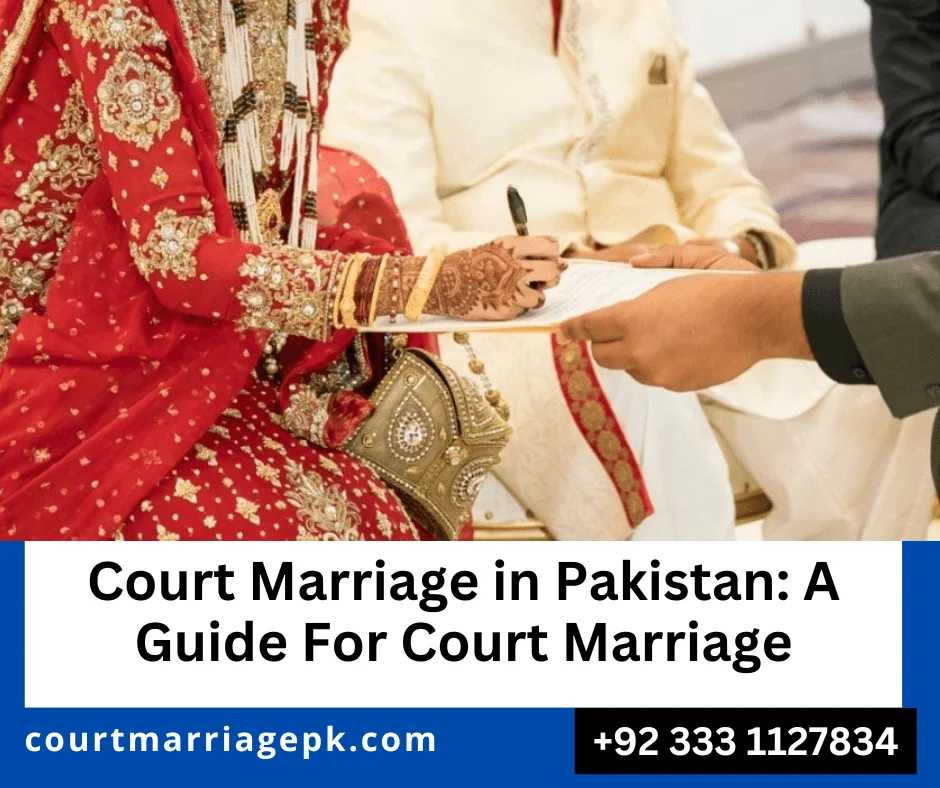
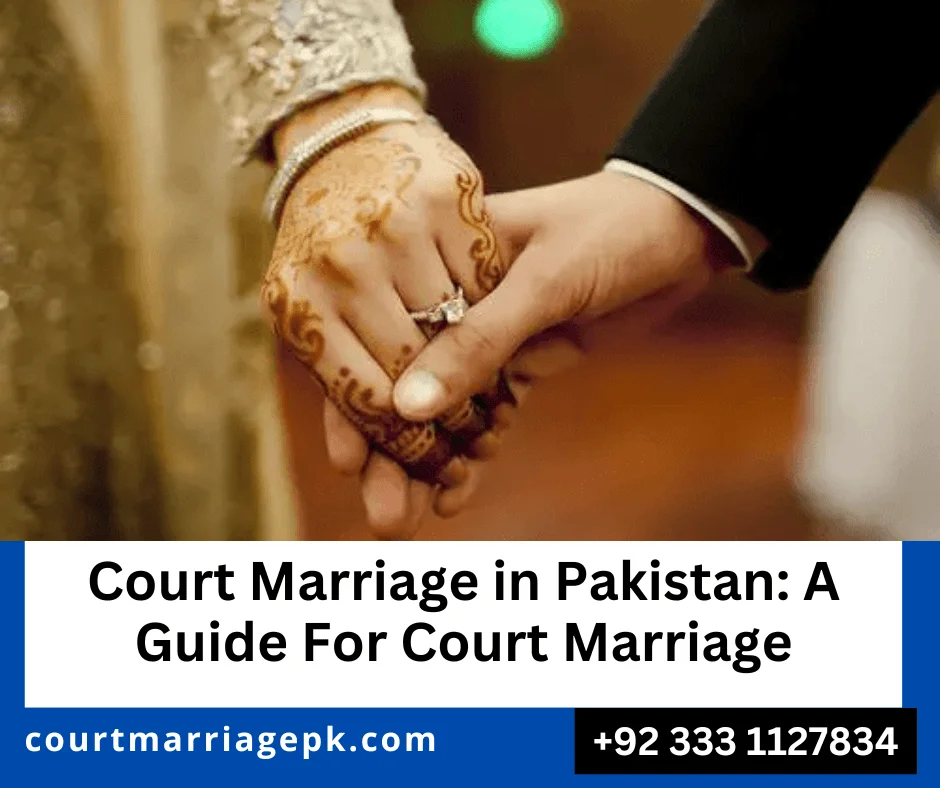
Efficiency stands out as a practical advantage of court marriage. The procedures involved are straightforward, and the time required is relatively short. This efficient process contrasts sharply with traditional wedding preparations, which can stretch over months. For couples interested in expediting their marriage formalization, court marriage presents a swift alternative.
Comparing the two, traditional marriages in Pakistan are culturally rich events steeped in rituals and traditions. They play a vital role in community and family bonding, offering a sense of continuity and celebration. Conversely, court marriages favor pragmatism and personalization. The decision ultimately boils down to individual preferences, each type of marriage offering a unique set of advantages.
Special Considerations for Court Marriage
Court marriage in Pakistan offers a streamlined, legally recognized alternative for couples who prefer a more straightforward process than traditional wedding ceremonies. However, certain considerations must be taken into account to ensure the smooth execution and subsequent recognition of the marriage.
Accessibility for all couples, including those in interfaith or cross-cultural relationships, is one of the foremost advantages of court marriage in Pakistan. The legal framework guarantees equal rights and protection under the law, making court marriage an appealing option for couples who may face societal or familial opposition. Also, given the legal backing, the marriage is recognized by all Pakistani jurisdictions.
For foreign nationals looking to marry in Pakistan, the process is also accommodating, provided they meet local legal requirements. These include obtaining a No Objection Certificate (NOC) from their respective embassies and ensuring all documentation is verified. This inclusivity demonstrates Pakistan’s commitment to protecting the rights of all individuals and promoting lawful marriages.
Privacy is a significant concern for many couples, and court marriages provide a level of discretion not always attainable through traditional ceremonies. The proceedings are conducted within judicial premises, away from public scrutiny, which can be invaluable for individuals desiring limited exposure and for those in sensitive situations.
Despite its benefits, there are notable challenges associated with court marriages. Societal and cultural norms may present hurdles, especially in more conservative regions where traditional marriages receive overwhelming preference. Couples may encounter social stigma, familial estrangement, or community backlash. Furthermore, the legal process, although straightforward, is devoid of the cultural customs and rituals that many families value, potentially causing interpersonal conflicts.
In summary, court marriage in Pakistan offers a legally sound, private, and inclusive option for couples from diverse backgrounds. However, it is essential to weigh these benefits against potential societal and cultural challenges to make an informed decision.

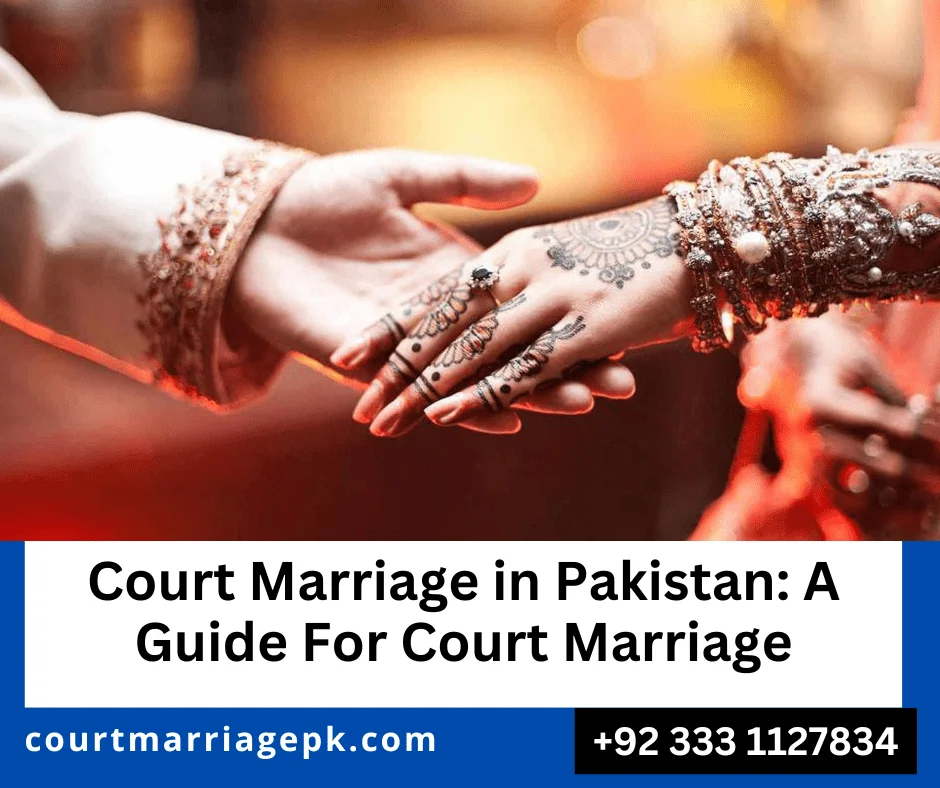
Conclusion and Final Thoughts
The journey through the intricacies of getting a court marriage in Pakistan unveils a modern legal framework that facilitates couples aiming for a legitimate, streamlined, and private matrimonial union. This guide has detailed the prerequisites, procedural steps, and advantages of opting for a court marriage as opposed to traditional, arranged marriages. While both forms of matrimonial unions hold cultural and societal significance, court marriages are increasingly seen as a pragmatic option in urban areas.
In contemporary urban Pakistan, the trend of court marriage is steadily gaining traction. This shift can be attributed to changing societal norms, increased education levels, and a growing emphasis on individual autonomy. While arranged marriages continue to be predominant, particularly in rural regions where traditional values are strong, court marriages offer a viable alternative for those seeking to prioritize personal choice and mutual consent.
Social attitudes play a critical role in shaping one’s decision to opt for court marriage. Although legal acceptance is robust, societal perceptions can vary significantly. Families and communities may harbor reservations based on deeply entrenched cultural beliefs. Consequently, couples considering court marriage should engage in open communication with their families to address potential concerns and seek support.
Practical advice for couples considering a court marriage in Pakistan includes ensuring thorough documentation and understanding the legal requirements. It is also wise to seek counsel from legal professionals to navigate through the legalities smoothly. Emotional preparedness and mutual understanding are equally crucial, as societal pressures can, at times, be challenging.
Court marriage in Pakistan represents a synthesis of modern legal provisions and evolving social dynamics. As this trend continues to grow, it symbolizes a shift towards more empowered and consensual matrimonial choices, reflecting broader progressive changes within urban societies.
